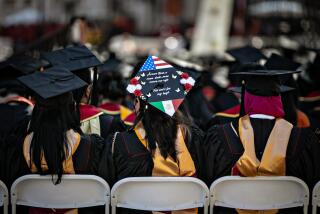Physician, Know Thy Humanities : Doctors Are Treating People, Not Diseases
- Share via
It is something that has probably been taught at medical schools since the first one was in session: Never assume that the sound of hoofbeats signifies a horse. Sometimes it may be a zebra.
Translation: A physician should never assume that a standard complaint has a standard cause.
And since diagnosis is the most difficult of the healing arts, it wouldn’t be a bad idea if the doctor has the kind of an open and active mind resulting from studies of the other arts and humanities in general, according to one who trains future physicians.
“Doctors must remember that they are treating people, not diseases,” said Prof. David Sadava of Scripps College in Claremont.
As a biology teacher at the Claremont Colleges, Sadava finds about two-thirds of his students are premed. They get what they signed up for--but are also told that knowing history is as important as knowing about tissues.
“In dealing with a patient, one of the first things a doctor does is take a personal medical history,” the 39-year-old teacher said in his office recently. “History places an individual in the context of the passage of time and of the social environment.
Sensitive to Changes
“A doctor who has studied history will probably be more sensitive to changes in social environment that have happened to this person over time, and therefore can relate how these changes have contributed to the person’s medical history.”
Although his works generally can’t be found on the shelves in a physician’s office, Shakespeare is of value, especially to premed students, because of his understanding of the human condition, Sadava said.
To bill or not to bill, that is the question?
“No,” the professor corrected, “the reason is that Shakespeare prepares a student to meet everyone in life from the Hamlet who can’t face up to making an important decision to the Macbeth who is plagued by guilt.
“Much of any literature is about people and their interactions with each other and with their environment, both social and physical. While medical psychiatry courses can place humans in neat categories of mental disease, literature allows a physician to see the continuity of human experience.”
Sadava’s thoughts on other areas of liberal arts and their usefulness to would-be doctors:
Philosophy: “Among other things, it studies logical thinking and deduction, both of which can be important in diagnosis and treatment. And, of course, ethics is an obviously important subject when dealing with critical care situations. This is the one area of the humanities that medical schools have become relatively active in.”
Religion: “Study of this can be important to enable a physician to possibly deal with a patient’s attitudes toward disease. A problem in medicine can be a patient’s compliance--is he or she willing to follow directions? Too often the patient ends up in the office again because he didn’t take the pills.”
Poetry: “When a physician is interviewing a patient, it is valuable to listen to the nuances in language. Poets give us a keen understanding of language, which in turn helps us with our own communication.”
Add to Our Insights
Painting and sculpture: “There is even premed value in these. The visual arts add to our insights about human personality. We see the different ways that artists perceive the world and other people.”
After being graduated from Carleton University in Ottawa with a bachelor of science degree, Sadava earned a Ph.D. in biology and chemistry from UC San Diego.
Although the professor, who is part of the joint science center of Scripps-Pitzer-Claremont McKenna, has a background in science, he has had his outlook on the humanities for years. And his feelings were buttressed a little more than a year ago by a report from the Assn. of American Medical Colleges.
“The belief by medical school applicants that medical faculties prefer a narrow science-based preparation is supported by the excessive emphasis many admissions committees give to applicants’ scores on the Medical College Admission Test science subtests,” that report said. “An intensive effort is necessary to redeem baccalaureate education from premature specialization.”
Students nowadays often pursue a bachelor’s degree with only the goal in mind of being admitted to their chosen profession, the report continued.
“The traditional objectives of college education--to sharpen one’s critical and analytical skills and to investigate the varieties of human experience through balanced studies in the natural and social sciences and in the humanities--are, thus, displaced by students’ preoccupation with doing whatever they think they need to do to get into medical school.”
Concluded that chapter of the report: “To appreciate the many dimensions of human experience requires informed reflection upon the literature, the philosophy, and the arts that are included in the cultural heritage of all people in our society.”
A Pilot Project
Virtually all medical schools require applicants to take the Medical College Admission Test (M-CAT). “It is just a pilot project, but last year, for the first time, the test included a section in which the students were asked to write an essay,” Sadava said.
As far as this teacher of premed students is concerned, it is a step in the right direction.
“The medical schools require science courses for admission,” he went on. “What happens is that most premed students spent most of their elective time taking still more science courses.”
It is the hope of Sadava and an increasing number of other educators that this outlook will change. And perhaps the day will come when a patient will be told by a physician to read two good books and call him in the morning.






